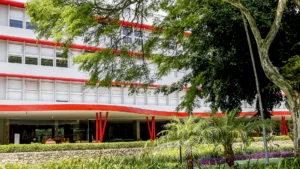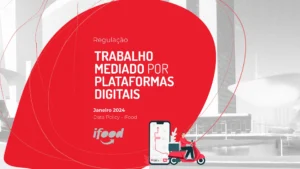By Debora Gershon and Erica Diniz Oliveira*
iFood is a platform which connects delivery drivers, consumers and commercial establishments (restaurants, markets and pharmacies). We are a Brazilian technology made for Brazilians.
Our story began in 1997, with a printed menu guide, but it was in 2011, in the interior of São Paulo, that iFood, as we know it today, began to take shape. Based on that guide, we launched the app and website and, in 2018, we began operating at scale with delivery people connected to our platform.
Due to the evolution of a very dynamic market, and with the aim of meeting the different demands of commercial establishments, today We operate in two different ways.
In the first, called marketplace, iFood connects establishments to the application's customers and the commercial establishment is responsible for logistics with its own or third-party couriers – a common practice prior to the arrival of digital platforms in this sector. This model represents the majority of our orders, around 61%.
In the second model, called full service, we are responsible for connecting the three ends: customers, establishments and delivery people registered directly in the application. This contract format applies to less than 40% of our orders, but has impacted the lives of thousands of workers who see iFood as an opportunity to generate income.
Aware of the size of the responsibility that comes from impacting the lives of so many people, since 2021 we have expressed a pro-regulation position to create a legal environment favorable to increasing the social protection of delivery people, recognizing the singularities of our business model.
This positioning, however, is not the result of solitary reflection by the company's managers. On the contrary, it was built through active listening to different actors – delivery drivers, social organizations, academia and unorganized civil society. It is the confidence in the correctness of this stance that keeps us extremely attentive to the social demands relating to our activities, such as those exposed in the Researchers' Manifesto on Labor Regulation mediated by digital platforms.
The manifesto is a democratic instrument of great importance, which gives us the opportunity to once again open dialogue about the characteristics of the company and the sector, fundamental to the debate on regulation.
iFood agrees with many of the issues set out in the document and has been focusing on them with the aim of systematically improving its practices. Below, we present some data and information and comment on the main demands presented in the hope of strengthening communication channels.
Earnings
The engagement profile of delivery people on the iFood platform is highly heterogeneous. Considering data from 2022, 40.5% of couriers responsible for deliveries of the model full service were online on the platform for less than 20 hours in a month and 20.5% between 20 hours and 40 hours in the same period.
In other words, approximately 61% of the total number of couriers responsible for deliveries of the model full service were available on the platform for less than 40 hours per month in 2022, while only 1.2% had monthly engagement between 180 and 220 hours. This data illustrates the revealed preference of delivery drivers for autonomy and flexibility.
However, this heterogeneity in the level of engagement of delivery people is not replicated when observing the earnings from the activity. Regardless of the engagement profile, delivery drivers who work with iFood receive, on average, more than twice the national minimum hourly wage.
We have made significant progress in control instruments that allow us to maintain this fundamental commitment to Brazilian society, aiming to correct any distortions. Between 2021 and 2022, three minimum earnings adjustments were made by the platform to meet this premise, with the company making a public commitment to evaluate, at least once a year, the need to adjust the rates charged to delivery drivers.
Social protection
For over 3 years, iFood has been discussing and acting in favor of increased social protection of delivery people mediated by the platform. Today we offer a set of benefits, protecting delivery people in times of greatest adversity, considering the time interval between accepting the order and returning home.
They are offered, without compensation from the workers, for example, life insurance, accident insurance, temporary injury insurance, telemedicine and help for children minors in the event of a fatal accident.
It is worth noting that we have been actively working to improve access to these benefits. Additionally, more than 700 support points are active in Brazil, since the model full service was created in 2018.
Finally, and even more importantly, iFood defends, via Amobitec, a regulation that includes workers mediated by digital platforms for the individual transport of passengers and goods in the public pension system, as self-employed, which guarantees a counterpart from companies in the system.
This protects the worker, which is our main objective, and has the potential to reduce the social security deficit compared to the counterfactuals of the BPC or the mandatory MEI. It is an important contribution and befitting a company the size of ours. We are confident that regulation of the sector will strengthen the activity's protective mechanisms.
Power inequality and labor relations
We do not agree with the thesis that delivery men and women maintain or should maintain an employment relationship with iFood or any other digital platform whose business model is similar. The importance attributed by the vast majority of workers in the sector to autonomy, flexibility and freedom in carrying out this type of activity is in line with our conception.
And data helps us here. In addition to what has already been briefly mentioned, a sample survey carried out by Locomotiva in 2021 revealed that 70% of delivery drivers preferred the flexible work model, without CLT.
In the same year, a Datafolha study with delivery people and drivers found identical results: 2 out of 3 preferred to be classified as self-employed, ruling out the formal relationship. This is because the characteristics of this work differ from those provided for in the CLT, even when considering the 2017 labor reform. The CLT is an extremely important instrument in Brazil, but it does not cover the particularities of new labor relations and, particularly, of our sector. .
The intermittent contract, for example, created before iFood started operating with the model full service previously mentioned, has been exposed as an alternative for formalizing workers but makes demands that, from a theoretical point of view, do not dialogue with the characteristics of the gig economy and which, from an operational point of view, make it impossible to carry out delivery activities without any restrictions.
On the one hand, this type of contract requires anticipation of demand on the part of the company. On the other hand, it forces workers to pay fines if they fail to provide the contracted service. iFood's business model is essentially flexible. This for us is not a merely economic-financial issue, it is conceptual.
The previously mentioned engagement profile data on the platform for the year 2022 helps to clarify the scenario. Any regulatory debate in the sector needs to start from this reality that 61% of model couriers full service are logged in to the iFood platform for less than 40 hours per month, while only 1.2% have monthly engagement between 180 and 220 hours.
Data protection and transparency
iFood has rigorous processes for capturing and processing data collected from delivery people, consumers and customers, with no chance of data being collected and processed without prior notice and agreement from the parties. Our data protection policies are described in our privacy statement and we constantly use technology to increase our security procedures.
With regard to transparency, we have systematically improved our practices, based on dialogue with the delivery people themselves. Giving visibility to blocking hypotheses is a demand of the category, which, since the National Delivery Workers Forum, in 2021, has been addressed within the company.
From this listening, we have already changed rules and increased communication channels to publicize them. Managing the platform in a transparent way is a value for us and we have made progress in this direction, including in terms of earnings.
All calculations that make up the amounts paid for deliveries – route, city and mode – are available for consultation. In the application itself, before accepting or rejecting an order, information is provided about the value of the delivery, as well as a statement with the respective values of the deliveries made. We know we need to move forward even further, and we will.
Taxation and socioeconomic impact
All iFood tax obligations are strictly complied with by the company. Furthermore, our indirect tax impact is quite relevant nationally. In 2020, for every R$ 1 collected by iFood's activities in taxes such as IPI, ICMS and ISS, another R$ 1.11 was collected indirectly in Brazil.
And our contribution to the Brazilian economy is not limited to tax revenue. A iFood's participation in GDP was 0.43% in that same year – that is, the company alone contributed almost 0.5% to the national GDP. In addition, we generated around 730 thousand direct and indirect jobs.
From a consumption point of view, for every R$ 1000 spent on iFood, another R$ 1414.00 is generated in the Brazilian economy. This data results from a partnership with FIPE to analyze our value chain based on the input-output matrix methodology. New research of this nature is in the process of being prepared.
It is our intention to continue with constructive and democratic dialogue, taking clear positions and providing non-sensitive data to expand knowledge of the sector.
We recognize academia as an absolutely fundamental actor in the design of any public policy and, consequently, in the regulatory debate on digital platforms. For no other reason do we maintain two areas of research and academic dialogue —Data Policy and Economics—, dedicated to the study of academic production on the subject and dialogue with interested research groups. This is how we intend to feed the future of the sector – keeping our “kitchen” open.
*Debora has a master's and doctorate in Political Science from IESP/UERJ, with a postdoc from UCSD, San Diego, and head of Data Policy and Academic Relations at iFood.
Erica has a master's and doctorate in Economics from the Postgraduate School of Economics (EPGE) at Fundação Getúlio Vargas (FGV) and head of Economics at iFood.


